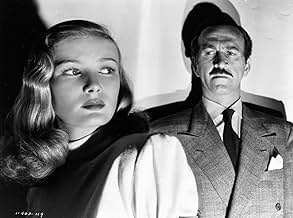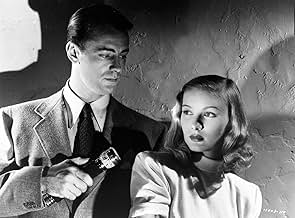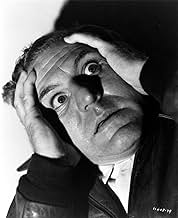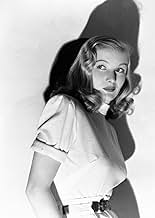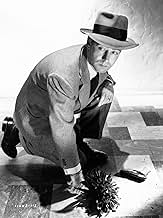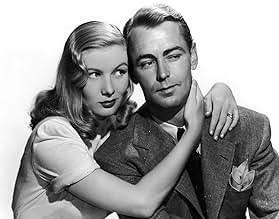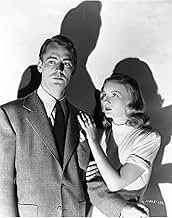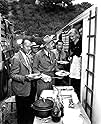VALUTAZIONE IMDb
7,1/10
10.139
LA TUA VALUTAZIONE
Un ex pilota di bombardieri è sospettato di aver ucciso la moglie infedele.Un ex pilota di bombardieri è sospettato di aver ucciso la moglie infedele.Un ex pilota di bombardieri è sospettato di aver ucciso la moglie infedele.
- Regia
- Sceneggiatura
- Star
- Candidato a 1 Oscar
- 1 vittoria e 1 candidatura in totale
Bea Allen
- News Clerk
- (non citato nei titoli originali)
Harry Barris
- Bellhop
- (non citato nei titoli originali)
George Barton
- Cab Driver
- (non citato nei titoli originali)
Mary Bayless
- Bar Patron
- (non citato nei titoli originali)
Edward Biby
- Restaurant Patron
- (non citato nei titoli originali)
Nina Borget
- Mexican Waitress
- (non citato nei titoli originali)
Recensioni in evidenza
"The Blue Dahlia" is a flower and a nightclub, both of which figure in the plot of this 1946 film starring Alan Ladd, Veronica Lake, William Bendix and Howard da Silva. There's plenty of the busy, somewhat chaotic post-war atmosphere in this movie as war pals Johnny Morrison (Ladd), Buzz Wanchek (Bendix) and George Copeland (Hugh Beaumont) return from service. While the brain-damaged Buzz and Copeland get an apartment together, Morrison returns to his beautiful wife (Doris Dowling) whom he finds has been living a wild, party-filled existence and cheating on him with club owner Eddie Harwood (da Silva). Hurt and angry, Morrison, trying to get a cab in the rain, is picked up by none other than a beautiful blond named Joyce, who he does not know is actually Mrs. Harwood. After parting company, they both stay at the same inn without realizing it. The next morning, Morrison hears on the radio that his wife is dead, and the police are looking for him. On the run, and with some help from Joyce, Morrison tries to find out who really killed his wife.
This is a pretty good noir with a solid, effective performance from Ladd and excellent work by both Bendix and da Silva. There are plenty of suspects, too - viewers will have their pick. Though "The Blue Dahlia" is a decent noir, it's the frenetic post-war energy that makes it watchable rather than the story, which as one reviewer here pointed out, has the strange coincidence of Johnny being picked up by Mrs. Harwood. The other odd thing to this viewer, anyway, is the fact that the Bendix character is so obviously brain-damaged from the war (he has a plate in his head), yet no one seems to really pick up on it, or at least acknowledge it, until later in the film. He's told to pull himself together and allowed to drink. Meanwhile, loud music drives him nearly insane, and he suggests getting on a bus, not remembering he just got off of it.
The Veronica Lake role is criticized - it's true she doesn't have much to do; it's also true that not many people liked working with her; and that she wasn't the world's greatest actress (Raymond Chandler called her Moronica), but she and Ladd made a great, if short, team, and she was always beautiful to look at and listen to.
All in all, worth watching for one of the great noir teamings and some good performances.
This is a pretty good noir with a solid, effective performance from Ladd and excellent work by both Bendix and da Silva. There are plenty of suspects, too - viewers will have their pick. Though "The Blue Dahlia" is a decent noir, it's the frenetic post-war energy that makes it watchable rather than the story, which as one reviewer here pointed out, has the strange coincidence of Johnny being picked up by Mrs. Harwood. The other odd thing to this viewer, anyway, is the fact that the Bendix character is so obviously brain-damaged from the war (he has a plate in his head), yet no one seems to really pick up on it, or at least acknowledge it, until later in the film. He's told to pull himself together and allowed to drink. Meanwhile, loud music drives him nearly insane, and he suggests getting on a bus, not remembering he just got off of it.
The Veronica Lake role is criticized - it's true she doesn't have much to do; it's also true that not many people liked working with her; and that she wasn't the world's greatest actress (Raymond Chandler called her Moronica), but she and Ladd made a great, if short, team, and she was always beautiful to look at and listen to.
All in all, worth watching for one of the great noir teamings and some good performances.
"The Blue Dahlia" (1946) is a film noir directed by George Marshall and stars Alan Ladd, Veronica Lake, William Bendix, Howard Da Silva and Will Wright. It was the third pairing of the box-office bombshells Ladd and Lake and it is a marked improvement on their previous two outings, "This Gun for Hire" and "The Glass Key", both from 1942. The key credit to this should probably go to scriptwriter Raymond Chandler, probably the best hardboiled crime novelist there ever was along with Dashiell Hammett.
The story is classic noir: Johnny Morrison (Ladd), war veteran of the South Pacific, returns home to find his wife (Doris Dowling) has been unfaithful. He walks out on her, and shortly after she is found dead. His war buddies Buzz Wanchek (William Bendix) and George Copeland (Hugh Beaumont) believe he is innocent, but everything points towards to Morrison...
The screenplay has some vintage Chandler lines, and characters like Bendix's disturbed veteran and Wright's marvelously smarmy house peeper could have jumped out of his Philip Marlowe novels. However, the ending is weak due to interference from the U.S. military, but the movie as a whole still packs a sizable punch. Director Marshall serves his material admirably and cinematographer Lionel Lindon gives us some very dark and atmospheric shots. Acting wise, Bendix takes the top honours, but Ladd and Lake are both very good, as is Howard Da Silva, owner of the eponymous "Blue Dahlia Club" .
This film noir is one definitely to check out.
The story is classic noir: Johnny Morrison (Ladd), war veteran of the South Pacific, returns home to find his wife (Doris Dowling) has been unfaithful. He walks out on her, and shortly after she is found dead. His war buddies Buzz Wanchek (William Bendix) and George Copeland (Hugh Beaumont) believe he is innocent, but everything points towards to Morrison...
The screenplay has some vintage Chandler lines, and characters like Bendix's disturbed veteran and Wright's marvelously smarmy house peeper could have jumped out of his Philip Marlowe novels. However, the ending is weak due to interference from the U.S. military, but the movie as a whole still packs a sizable punch. Director Marshall serves his material admirably and cinematographer Lionel Lindon gives us some very dark and atmospheric shots. Acting wise, Bendix takes the top honours, but Ladd and Lake are both very good, as is Howard Da Silva, owner of the eponymous "Blue Dahlia Club" .
This film noir is one definitely to check out.
Here's another one of those classic favorites that I am still hoping gets transferred to DVD. It's been long overdue.
This is another Alan Ladd-Veronica Lake film (their third of the decade) but William Bendix steals the show as a G.I. who suffered brain damage in World War II. He is something to see and his wise-cracking lines are some of the best ever delivered in a film noir. He had a short temper and insulted everyone he came in contact with. I just laugh out loud at some of his stuff.
Doris Dowling is effective as a nasty woman and it's always fun to see Hugh Beaumont in a role other than the dad in "Leave It To Beaver." Howard da Silva and Will Wright also are entertaining in their supporting roles. Also, for you TV trivia fans: see if you can spot "Lois Lane" (Noel Neill) in here.
Never as gorgeous as billed, Lake still had a unique look and voice but she plays it pretty straight here, character-wise. I like her better when she wisecracks as she did in some of her other films.
This is a pretty good crime story. Nothing exceptional, but at least it keeps you guessing. You're never quite sure until the very end "whodunnit."
This is another Alan Ladd-Veronica Lake film (their third of the decade) but William Bendix steals the show as a G.I. who suffered brain damage in World War II. He is something to see and his wise-cracking lines are some of the best ever delivered in a film noir. He had a short temper and insulted everyone he came in contact with. I just laugh out loud at some of his stuff.
Doris Dowling is effective as a nasty woman and it's always fun to see Hugh Beaumont in a role other than the dad in "Leave It To Beaver." Howard da Silva and Will Wright also are entertaining in their supporting roles. Also, for you TV trivia fans: see if you can spot "Lois Lane" (Noel Neill) in here.
Never as gorgeous as billed, Lake still had a unique look and voice but she plays it pretty straight here, character-wise. I like her better when she wisecracks as she did in some of her other films.
This is a pretty good crime story. Nothing exceptional, but at least it keeps you guessing. You're never quite sure until the very end "whodunnit."
The Blue Dahlia is among the dozen or so titles that movie buffs would identify instantly as film noir. Certainly, it boasts all the proper credentials: Alan Ladd and Veronica Lake reunited for their third outing together (after This Gun For Hire and The Glass Key); a sinister supporting cast including William Bendix, Howard Da Silva and Hugh Beaumont; and an original screenplay by none other than Raymond Chandler.
It almost lives up to its reputation. Returning Navy hero Ladd finds that the wife he left behind has turned into (or always was) a faithless party girl, who killed their young son in a drunken accident. He walks out on her, later to learn she's been murdered. Hunted by the police, he's befriended by Lake, who turns out to be rather intimately involved in much of what happened....
Many noirs suffered from studio-imposed "happy" endings but generally kept their integrity until the closing few frames. The changes wrought on The Blue Dahlia, however, severely compromise it. Chandler's original killer was to be Ladd's war-buddy Bendix, the loose cannon with a steel plate in his head, erupting in pounding headaches and blackout rages whenever he hears "jungle music" -- the sexually liberating beat of postwar prosperity. Rejecting this ending as an insult to the gallant men who had won the war, Paramount, pressured by the Navy, forced Chandler to resort to a lame "the-butler-did-it" conclusion. Unfortunately, that compromise splashes back through the length of the movie, making little sense of Bendix' performance -- even of his presence, except as the rankest of red herrings -- and turning what might have been a topical and disturbing film noir into just another glossy '40s murder mystery.
It almost lives up to its reputation. Returning Navy hero Ladd finds that the wife he left behind has turned into (or always was) a faithless party girl, who killed their young son in a drunken accident. He walks out on her, later to learn she's been murdered. Hunted by the police, he's befriended by Lake, who turns out to be rather intimately involved in much of what happened....
Many noirs suffered from studio-imposed "happy" endings but generally kept their integrity until the closing few frames. The changes wrought on The Blue Dahlia, however, severely compromise it. Chandler's original killer was to be Ladd's war-buddy Bendix, the loose cannon with a steel plate in his head, erupting in pounding headaches and blackout rages whenever he hears "jungle music" -- the sexually liberating beat of postwar prosperity. Rejecting this ending as an insult to the gallant men who had won the war, Paramount, pressured by the Navy, forced Chandler to resort to a lame "the-butler-did-it" conclusion. Unfortunately, that compromise splashes back through the length of the movie, making little sense of Bendix' performance -- even of his presence, except as the rankest of red herrings -- and turning what might have been a topical and disturbing film noir into just another glossy '40s murder mystery.
Blue Dahlia, The (1946)
** 1/2 (out of 4)
Alan Ladd plays a pilot returning home after serving in WWII only to discover that his wife has been cheating on him. The wife ends up dead and Ladd is the main suspect so he takes off to prove his innocence and this is when he meets the wife (Veronica Lake) of the man who was having an affair with his wife. This film has the reputation of being a classic but I wouldn't hold it up that high as I found some of the plot to be rather boring and many scenes stretched out too long. With that said, the film does offer up some nice performances and fans of noir will probably want to check it out. I think the main reason to watch the film is for the performance of Ladd. He manages to be very believable in the role and I loved how laid back he was no matter what was going on. He could be flirting with Lake or fighting off some thugs but he remains the same level of calmness throughout. As for Lake, I wouldn't say she gives a good performance but she fits her role just fine. William Bendix and Hugh Beaumont play Ladd's buddies who also return home with him. I found Bendix to be quite good in his role, although I think the "monkey music" dialogue gets a bit old. Howard Da Silva, Howard Freeman, Doris Dowling and Tom Powers do nice work as well. The film contains some pretty good cinematography and director Marshall is able to build up a nice atmosphere throughout. The biggest problem I had with the film is that it really doesn't try to be anything that we haven't seen before. The dialogue isn't the strongest and it's pretty obvious who the killer is from the first time we see him. That is, the original killer. The studio changed the ending of the film and the new killer doesn't work at all and it comes across incredibly forced and stupid. So, either way, the ending really doesn't work because had they kept the original killer then it was way too obvious. The way they changed the killer comes off very silly. Either way, Ladd makes the film worth viewing at least once.
** 1/2 (out of 4)
Alan Ladd plays a pilot returning home after serving in WWII only to discover that his wife has been cheating on him. The wife ends up dead and Ladd is the main suspect so he takes off to prove his innocence and this is when he meets the wife (Veronica Lake) of the man who was having an affair with his wife. This film has the reputation of being a classic but I wouldn't hold it up that high as I found some of the plot to be rather boring and many scenes stretched out too long. With that said, the film does offer up some nice performances and fans of noir will probably want to check it out. I think the main reason to watch the film is for the performance of Ladd. He manages to be very believable in the role and I loved how laid back he was no matter what was going on. He could be flirting with Lake or fighting off some thugs but he remains the same level of calmness throughout. As for Lake, I wouldn't say she gives a good performance but she fits her role just fine. William Bendix and Hugh Beaumont play Ladd's buddies who also return home with him. I found Bendix to be quite good in his role, although I think the "monkey music" dialogue gets a bit old. Howard Da Silva, Howard Freeman, Doris Dowling and Tom Powers do nice work as well. The film contains some pretty good cinematography and director Marshall is able to build up a nice atmosphere throughout. The biggest problem I had with the film is that it really doesn't try to be anything that we haven't seen before. The dialogue isn't the strongest and it's pretty obvious who the killer is from the first time we see him. That is, the original killer. The studio changed the ending of the film and the new killer doesn't work at all and it comes across incredibly forced and stupid. So, either way, the ending really doesn't work because had they kept the original killer then it was way too obvious. The way they changed the killer comes off very silly. Either way, Ladd makes the film worth viewing at least once.
Lo sapevi?
- QuizThe pressure of having to finish the screenplay combined with the curveball of having to write an entirely new ending was too much for Raymond Chandler. He quickly came down with a severe case of writer's block. According to a near-legendary story, Chandler offered to finish the screenplay by working drunk; in exchange for sacrificing his health to produce the requisite pages on time, Chandler was permitted to work at home (a privilege rarely granted to screenwriters) and was provided two chauffeured cars, one to convey the completed pages to the studio and the other for his wife. Chandler turned the script in on time. Many now believe the drunkenness was simply a ruse by Chandler to wrangle extraordinary privileges from the desperate studio.
- BlooperJoyce tells Johnny that the tide is out. Clearly the tide is all the way in, completely covering the beach.
- Citazioni
Joyce Harwood: Well, don't you even say 'Good night'?
Johnny Morrison: It's "good-bye", and it's tough to say good-bye.
Joyce Harwood: Why is it? You've never seen me before tonight.
Johnny Morrison: Every guy's seen you before somewhere. The trick is to find you.
- ConnessioniFeatured in The Hollywood Collection: Alan Ladd: The True Quiet Man (1999)
I più visti
Accedi per valutare e creare un elenco di titoli salvati per ottenere consigli personalizzati
- How long is The Blue Dahlia?Powered by Alexa
Dettagli
- Data di uscita
- Paese di origine
- Lingua
- Celebre anche come
- La dalia azul
- Luoghi delle riprese
- Azienda produttrice
- Vedi altri crediti dell’azienda su IMDbPro
Botteghino
- Lordo Stati Uniti e Canada
- 2.700.000 USD
- Tempo di esecuzione1 ora 36 minuti
- Colore
- Proporzioni
- 1.33 : 1
Contribuisci a questa pagina
Suggerisci una modifica o aggiungi i contenuti mancanti



